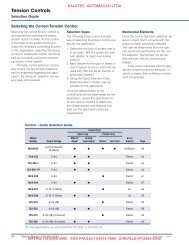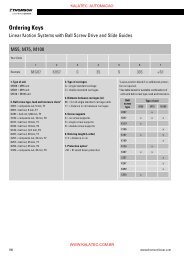- Page 2 and 3:
DVP-ES2/EX2/SS2/SA2/SX2/SE Operatio
- Page 4 and 5:
1 PLC Concepts DVP-ES2/EX2/SS2/SA2/
- Page 6 and 7:
7.4 Sending SDO, NMT and Reading Em
- Page 9 and 10:
PLC Concepts This chapter introduce
- Page 11 and 12:
1. PLC Concepts Scan time exception
- Page 13 and 14:
1. PLC Concepts 1.5 Ladder Logic Sy
- Page 15 and 16:
1. PLC Concepts Execution order of
- Page 17 and 18:
1. PLC Concepts Branch instruction
- Page 19 and 20:
1. PLC Concepts 1.6 Conversion betw
- Page 21 and 22:
1. PLC Concepts OR operation upward
- Page 23 and 24:
1. PLC Concepts Example 3: “Rever
- Page 25 and 26:
1. PLC Concepts Example 2 - Start F
- Page 27 and 28:
1. PLC Concepts Example 9 - Oscilla
- Page 29 and 30:
1. PLC Concepts Example 16 - Traffi
- Page 31 and 32:
1. PLC Concepts WPLSoft programming
- Page 33 and 34:
Programming Concepts DVP-ES2/EX2/SS
- Page 35 and 36:
2. Programming Concepts 32bit highs
- Page 37 and 38:
2. Programming Concepts 2.2 SS2 Mem
- Page 39 and 40:
2. Programming Concepts Specificati
- Page 41 and 42:
2. Programming Concepts Specificati
- Page 43 and 44:
2. Programming Concepts 2.4 SX2 Mem
- Page 45 and 46:
2. Programming Concepts Specificati
- Page 47 and 48:
2. Programming Concepts 2.6 PLC Bit
- Page 49 and 50:
2. Programming Concepts Binary Octa
- Page 51 and 52:
2. Programming Concepts Special M F
- Page 53 and 54:
2. Programming Concepts Special M F
- Page 55 and 56:
2. Programming Concepts Special M F
- Page 57 and 58:
2. Programming Concepts Special M F
- Page 59 and 60:
2. Programming Concepts Special M F
- Page 61 and 62:
2. Programming Concepts Special M F
- Page 63 and 64:
2. Programming Concepts Accumulativ
- Page 65 and 66:
2. Programming Concepts M relays M1
- Page 67 and 68:
2. Programming Concepts Applicable
- Page 69 and 70:
2. Programming Concepts 1. X21 driv
- Page 71 and 72:
2. Programming Concepts X20 X21 A-p
- Page 73 and 74:
2. Programming Concepts Special D D
- Page 75 and 76:
2. Programming Concepts Special D C
- Page 77 and 78:
2. Programming Concepts Special D D
- Page 79 and 80:
2. Programming Concepts Special D C
- Page 81 and 82:
2. Programming Concepts Special D C
- Page 83 and 84:
2. Programming Concepts 2.14 E, F I
- Page 85 and 86:
2. Programming Concepts 20 X0 CALL
- Page 87 and 88:
2. Programming Concepts 2.16 Applic
- Page 89 and 90:
2. Programming Concepts 2. D1008 sa
- Page 91 and 92:
2. Programming Concepts Function Gr
- Page 93 and 94:
2. Programming Concepts DABSR: 1. M
- Page 95 and 96:
2. Programming Concepts Content b7
- Page 97 and 98:
2. Programming Concepts Note: 1. Th
- Page 99 and 100:
2. Programming Concepts 5. The anal
- Page 101 and 102:
2. Programming Concepts Function Gr
- Page 103 and 104:
2. Programming Concepts D1140: Numb
- Page 105 and 106:
2. Programming Concepts Function Gr
- Page 107 and 108:
2. Programming Concepts D1442 D1458
- Page 109 and 110:
2. Programming Concepts M1416 M1417
- Page 111 and 112:
2. Programming Concepts accessible
- Page 113 and 114:
2. Programming Concepts M1002 MOV K
- Page 115 and 116:
2. Programming Concepts e) Commands
- Page 117 and 118:
Instruction Set This chapter explai
- Page 119 and 120:
3. Instruction Set execution time c
- Page 121 and 122:
3. Instruction Set Explanations: Th
- Page 123 and 124:
3. Instruction Set Program example:
- Page 125 and 126:
3. Instruction Set between MC/MCR w
- Page 127 and 128:
3. Instruction Set Timing Diagram:
- Page 129 and 130:
3. Instruction Set : IRET Interrupt
- Page 131 and 132:
3. Instruction Set Source: if there
- Page 133 and 134:
3. Instruction Set 1. X, Y, M, and
- Page 135 and 136:
3. Instruction Set 5. For counters
- Page 137 and 138:
3. Instruction Set Binary Floating
- Page 139 and 140:
3. Instruction Set The opposite dia
- Page 141 and 142:
3. Instruction Set API Mnemonic App
- Page 143 and 144:
3. Instruction Set API Mnemonic App
- Page 145 and 146:
3. Instruction Set API Mnemonics Ap
- Page 147 and 148:
3. Instruction Set API Mnemonic App
- Page 149 and 150:
3. Instruction Set API Mnemonic App
- Page 151 and 152:
3. Instruction Set Mnemonic Applica
- Page 153 and 154:
3. Instruction Set Mnemonic Applica
- Page 155 and 156:
3. Instruction Set Mnemonic Applica
- Page 157 and 158:
3. Instruction Set Mnemonic Applica
- Page 159 and 160:
3. Instruction Set Program example
- Page 161 and 162:
3. Instruction Set *1: Y1 is dual o
- Page 163 and 164:
3. Instruction Set API Mnemonic Fun
- Page 165 and 166:
3. Instruction Set API Mnemonic Fun
- Page 167 and 168:
3. Instruction Set execute DI instr
- Page 169 and 170:
3. Instruction Set CJ Instruction P
- Page 171 and 172:
3. Instruction Set API Mnemonic Fun
- Page 173 and 174:
3. Instruction Set API Mnemonic Ope
- Page 175 and 176:
3. Instruction Set Program example
- Page 177 and 178:
3. Instruction Set API Mnemonic Ope
- Page 179 and 180:
3. Instruction Set API Mnemonic Ope
- Page 181 and 182:
3. Instruction Set Program example
- Page 183 and 184:
3. Instruction Set API Mnemonic Ope
- Page 185 and 186:
3. Instruction Set Program example
- Page 187 and 188:
3. Instruction Set API Mnemonic Ope
- Page 189 and 190:
3. Instruction Set API Mnemonic Ope
- Page 191 and 192:
3. Instruction Set API Mnemonic Ope
- Page 193 and 194:
3. Instruction Set API Mnemonic Ope
- Page 195 and 196:
3. Instruction Set Program Example:
- Page 197 and 198:
3. Instruction Set API Mnemonic Ope
- Page 199 and 200:
3. Instruction Set API Mnemonic Ope
- Page 201 and 202:
3. Instruction Set API Mnemonic Ope
- Page 203 and 204:
3. Instruction Set API Mnemonic Ope
- Page 205 and 206:
3. Instruction Set API Mnemonic Ope
- Page 207 and 208:
3. Instruction Set API Mnemonic Ope
- Page 209 and 210:
3. Instruction Set API Mnemonic Ope
- Page 211 and 212:
3. Instruction Set API Mnemonic Ope
- Page 213 and 214:
3. Instruction Set API Mnemonic Ope
- Page 215 and 216:
3. Instruction Set API Mnemonic Ope
- Page 217 and 218:
3. Instruction Set API Mnemonic Ope
- Page 219 and 220:
3. Instruction Set 2. For clearing
- Page 221 and 222:
3. Instruction Set Program Example
- Page 223 and 224:
3. Instruction Set Program Example
- Page 225 and 226:
3. Instruction Set API Mnemonic Ope
- Page 227 and 228:
3. Instruction Set API Mnemonic Ope
- Page 229 and 230:
3. Instruction Set M1000 Y0 Y1 X0 Y
- Page 231 and 232:
3. Instruction Set API Mnemonic Ope
- Page 233 and 234:
3. Instruction Set M1000 1 2 3 FLT
- Page 235 and 236:
3. Instruction Set X0 REF Y0 K4 Pro
- Page 237 and 238:
3. Instruction Set API Mnemonic Ope
- Page 239 and 240:
3. Instruction Set Points to note:
- Page 241 and 242:
3. Instruction Set ‣ Table of set
- Page 243 and 244:
3. Instruction Set ‣ 6 comparator
- Page 245 and 246:
3. Instruction Set 9. Count value s
- Page 247 and 248:
3. Instruction Set API Mnemonic Ope
- Page 249 and 250:
3. Instruction Set DHSZ instruction
- Page 251 and 252:
3. Instruction Set API Mnemonic Ope
- Page 253 and 254:
3. Instruction Set API Mnemonic Ope
- Page 255 and 256:
3. Instruction Set 32. There is no
- Page 257 and 258:
3. Instruction Set Program Example
- Page 259 and 260:
3. Instruction Set 46. When M1113 =
- Page 261 and 262:
3. Instruction Set API Mnemonic Ope
- Page 263 and 264:
3. Instruction Set 66. There is no
- Page 265 and 266:
3. Instruction Set • When M1156/M
- Page 267 and 268:
3. Instruction Set Explanations: W
- Page 269 and 270:
3. Instruction Set 80. When S1 (zer
- Page 271 and 272:
3. Instruction Set 89. Zero return
- Page 273 and 274:
3. Instruction Set b) Ladder Diagra
- Page 275 and 276:
3. Instruction Set M1046: Indicates
- Page 277 and 278:
3. Instruction Set API Mnemonic Ope
- Page 279 and 280:
3. Instruction Set API Mnemonic Ope
- Page 281 and 282:
3. Instruction Set API Mnemonic Ope
- Page 283 and 284:
3. Instruction Set API Mnemonic Ope
- Page 285 and 286:
3. Instruction Set API Mnemonic Ope
- Page 287 and 288:
3. Instruction Set If X20 = ON, D12
- Page 289 and 290:
3. Instruction Set K2: With n = 2,
- Page 291 and 292:
3. Instruction Set Points to note:
- Page 293 and 294:
3. Instruction Set The combination
- Page 295 and 296:
3. Instruction Set The conversion w
- Page 297 and 298:
3. Instruction Set API Mnemonic Ope
- Page 299 and 300:
3. Instruction Set API Mnemonic Ope
- Page 301 and 302:
3. Instruction Set API Mnemonic Ope
- Page 303 and 304:
3. Instruction Set 174. External wi
- Page 305 and 306:
3. Instruction Set 182. Please use
- Page 307 and 308:
3. Instruction Set API Mnemonic Ope
- Page 309 and 310:
3. Instruction Set VCC Pull-up resi
- Page 311 and 312:
3. Instruction Set API Mnemonic Ope
- Page 313 and 314:
3. Instruction Set API Mnemonic Ope
- Page 315 and 316:
3. Instruction Set X20 start signal
- Page 317 and 318:
3. Instruction Set API Mnemonic Ope
- Page 319 and 320:
3. Instruction Set API Mnemonic Ope
- Page 321 and 322:
3. Instruction Set Receiving data:
- Page 323 and 324:
3. Instruction Set Registers for re
- Page 325 and 326:
3. Instruction Set 3. The forward r
- Page 327 and 328:
3. Instruction Set Sending data: (P
- Page 329 and 330:
3. Instruction Set Flag Function Ac
- Page 331 and 332:
3. Instruction Set Special register
- Page 333 and 334:
3. Instruction Set Flag Function Ac
- Page 335 and 336:
3. Instruction Set COM1 COM2 COM3 F
- Page 337 and 338:
3. Instruction Set Value H0005 Erro
- Page 339 and 340:
3. Instruction Set Field Name Addre
- Page 341 and 342:
3. Instruction Set Timing diagram:
- Page 343 and 344:
3. Instruction Set API Mnemonic Ope
- Page 345 and 346:
3. Instruction Set n D K9 K10 K11 K
- Page 347 and 348:
3. Instruction Set D n K9 K10 K11 K
- Page 349 and 350:
3. Instruction Set 4. When n = 4, t
- Page 351 and 352:
3. Instruction Set API Mnemonic Ope
- Page 353 and 354:
3. Instruction Set API Mnemonic Ope
- Page 355 and 356:
3. Instruction Set API Mnemonic Ope
- Page 357 and 358:
3. Instruction Set Points to note:
- Page 359 and 360:
3. Instruction Set Device No. S 3 +
- Page 361 and 362:
3. Instruction Set Device No. S 3 +
- Page 363 and 364:
3. Instruction Set 2. When control
- Page 365 and 366:
3. Instruction Set Example 2: Block
- Page 367 and 368:
3. Instruction Set 0 511 0rpm 3000
- Page 369 and 370:
3. Instruction Set Application 3: U
- Page 371 and 372:
3. Instruction Set From the figure
- Page 373 and 374:
3. Instruction Set API Mnemonic Ope
- Page 375 and 376:
3. Instruction Set API Mnemonic Ope
- Page 377 and 378:
3. Instruction Set API Mnemonic Ope
- Page 379 and 380:
3. Instruction Set API Mnemonic Ope
- Page 381 and 382:
3. Instruction Set API Mnemonic Ope
- Page 383 and 384:
3. Instruction Set API Mnemonic Ope
- Page 385 and 386:
3. Instruction Set Program Example
- Page 387 and 388:
3. Instruction Set Program Example
- Page 389 and 390:
3. Instruction Set API Mnemonic Ope
- Page 391 and 392:
3. Instruction Set Registers for re
- Page 393 and 394:
3. Instruction Set Program Example
- Page 395 and 396:
3. Instruction Set 5. If rising-edg
- Page 397 and 398:
3. Instruction Set • In STOP inst
- Page 399 and 400:
3. Instruction Set API Mnemonic Ope
- Page 401 and 402:
3. Instruction Set a) Range of S 1
- Page 403 and 404:
3. Instruction Set API Mnemonic Ope
- Page 405 and 406:
3. Instruction Set Received data (r
- Page 407 and 408:
3. Instruction Set Program Example:
- Page 409 and 410:
3. Instruction Set API Mnemonic Ope
- Page 411 and 412:
3. Instruction Set API Mnemonic Ope
- Page 413 and 414:
3. Instruction Set API Mnemonic Ope
- Page 415 and 416:
3. Instruction Set API Mnemonic Ope
- Page 417 and 418:
3. Instruction Set API Mnemonic Ope
- Page 419 and 420:
3. Instruction Set API Mnemonic Ope
- Page 421 and 422:
3. Instruction Set API Mnemonic Ope
- Page 423 and 424:
3. Instruction Set API Mnemonic Ope
- Page 425 and 426:
3. Instruction Set API Mnemonic Ope
- Page 427 and 428:
3. Instruction Set API Mnemonic Ope
- Page 429 and 430:
3. Instruction Set M0 RST M1081 DFL
- Page 431 and 432:
3. Instruction Set API Mnemonic Ope
- Page 433 and 434:
3. Instruction Set API Mnemonic Ope
- Page 435 and 436:
3. Instruction Set API Mnemonic Ope
- Page 437 and 438:
3. Instruction Set API Mnemonic Ope
- Page 439 and 440:
3. Instruction Set API Mnemonic Ope
- Page 441 and 442:
3. Instruction Set API Mnemonic Ope
- Page 443 and 444:
3. Instruction Set API Mnemonic Ope
- Page 445 and 446:
3. Instruction Set API Mnemonic Ope
- Page 447 and 448:
3. Instruction Set API Mnemonic Ope
- Page 449 and 450:
3. Instruction Set 3. In ASCII or R
- Page 451 and 452:
3. Instruction Set Register Data De
- Page 453 and 454:
3. Instruction Set PLC data receivi
- Page 455 and 456:
3. Instruction Set Register Data De
- Page 457 and 458:
3. Instruction Set Register Data De
- Page 459 and 460:
3. Instruction Set Register Data De
- Page 461 and 462:
3. Instruction Set Registers for re
- Page 463 and 464:
3. Instruction Set ASCII mode (COM3
- Page 465 and 466:
3. Instruction Set RTU mode (M1143
- Page 467 and 468:
3. Instruction Set 4. Take the conn
- Page 469 and 470:
3. Instruction Set Registers for da
- Page 471 and 472:
3. Instruction Set Program Example
- Page 473 and 474:
3. Instruction Set PLC VFD-B,PLC tr
- Page 475 and 476:
3. Instruction Set API Mnemonic Ope
- Page 477 and 478:
3. Instruction Set 6. Please use NO
- Page 479 and 480:
3. Instruction Set API Mnemonic Ope
- Page 481 and 482:
3. Instruction Set Output in revers
- Page 483 and 484:
3. Instruction Set State 5: Current
- Page 485 and 486:
3. Instruction Set API Mnemonic Ope
- Page 487 and 488:
3. Instruction Set 11. Ramp-down ti
- Page 489 and 490:
3. Instruction Set D1232 D1233 D123
- Page 491 and 492:
3. Instruction Set 10. M1305 and M1
- Page 493 and 494:
3. Instruction Set API Mnemonic Ope
- Page 495 and 496:
3. Instruction Set API Mnemonic Ope
- Page 497 and 498:
3. Instruction Set X0 TSUB D0 D10 D
- Page 499 and 500:
3. Instruction Set Points to note:
- Page 501 and 502:
3. Instruction Set 1, second data r
- Page 503 and 504:
3. Instruction Set API Mnemonic Ope
- Page 505 and 506:
3. Instruction Set API Mnemonic Ope
- Page 507 and 508:
3. Instruction Set API Mnemonic Ope
- Page 509 and 510:
3. Instruction Set API Mnemonic Ope
- Page 511 and 512:
3. Instruction Set API Mnemonic Ope
- Page 513 and 514:
3. Instruction Set API Mnemonic Ope
- Page 515 and 516:
3. Instruction Set API Mnemonic Ope
- Page 517 and 518:
3. Instruction Set M1002 MOV H81 D1
- Page 519 and 520:
3. Instruction Set API Mnemonic Ope
- Page 521 and 522:
3. Instruction Set Program example:
- Page 523 and 524:
3. Instruction Set API Mnemonic Ope
- Page 525 and 526:
3. Instruction Set API Mnemonic Ope
- Page 527 and 528:
3. Instruction Set API Mnemonic Ope
- Page 529 and 530:
3. Instruction Set API Mnemonic Ope
- Page 531 and 532:
3. Instruction Set API Mnemonic Ope
- Page 533 and 534:
3. Instruction Set API Mnemonic Ope
- Page 535 and 536:
3. Instruction Set API Mnemonic Ope
- Page 537 and 538:
3. Instruction Set API Mnemonic Ope
- Page 539 and 540:
3. Instruction Set API Mnemonic Ope
- Page 541 and 542:
3. Instruction Set 8. For pulse out
- Page 543 and 544:
3. Instruction Set API Mnemonic Ope
- Page 545 and 546:
20 segments 20 segments 3. Instruct
- Page 547 and 548:
3. Instruction Set that the arc has
- Page 549 and 550:
3. Instruction Set 3. Operation: Wh
- Page 551 and 552:
3. Instruction Set above). Place th
- Page 553 and 554:
3. Instruction Set API Mnemonic Ope
- Page 555 and 556:
3. Instruction Set API Mnemonic Ope
- Page 557 and 558:
3. Instruction Set Frequency Target
- Page 559 and 560:
3. Instruction Set EI M1002 MOV K10
- Page 561 and 562:
3. Instruction Set reset after CH0
- Page 563 and 564:
3. Instruction Set Function Explana
- Page 565 and 566:
3. Instruction Set M1540 Indicating
- Page 567 and 568:
3. Instruction Set Change target fr
- Page 569 and 570:
3. Instruction Set M0 EI DMOVP K100
- Page 571 and 572:
3. Instruction Set Program Example
- Page 573 and 574:
3. Instruction Set 6. Substitute th
- Page 575 and 576:
3. Instruction Set Program Example
- Page 577 and 578:
3. Instruction Set 9. The 16-bit co
- Page 579 and 580:
3. Instruction Set For A2-type only
- Page 581 and 582:
3. Instruction Set Points to note:
- Page 583 and 584:
3. Instruction Set 6. S 1 +0 specif
- Page 585 and 586:
3. Instruction Set API Mnemonic Ope
- Page 587 and 588:
3. Instruction Set API Mnemonic Ope
- Page 589 and 590:
3. Instruction Set API Mnemonic Ope
- Page 591 and 592:
3. Instruction Set API Mnemonic Ope
- Page 593 and 594:
3. Instruction Set API Mnemonic Ope
- Page 595 and 596:
3. Instruction Set API Mnemonic Ope
- Page 597 and 598:
3. Instruction Set API Mnemonic Ope
- Page 599 and 600:
3. Instruction Set API Mnemonic Ope
- Page 601 and 602:
3. Instruction Set API Mnemonic Ope
- Page 603 and 604:
Communications This chapter introdu
- Page 605 and 606:
4. Communications − − − 7 dat
- Page 607 and 608:
4. Communications Field name ASCII
- Page 609 and 610:
4. Communications Exception code: E
- Page 611 and 612:
4. Communications Field Name Exampl
- Page 613 and 614:
4. Communications Feedback message:
- Page 615 and 616:
4. Communications 4.5 Command Code
- Page 617 and 618:
4. Communications 4.5.3 Command Cod
- Page 619 and 620:
4. Communications Field Name ASCII
- Page 621 and 622:
4. Communications Sent message: Fie
- Page 623 and 624:
Sequential Function Chart This chap
- Page 625 and 626:
5. Sequential Function Chart action
- Page 627 and 628:
5. Sequential Function Chart Action
- Page 629 and 630:
5. Sequential Function Chart Retur
- Page 631 and 632:
5. Sequential Function Chart S10 S
- Page 633 and 634:
5. Sequential Function Chart 5.5 Ty
- Page 635 and 636:
5. Sequential Function Chart Ladder
- Page 637 and 638: 5. Sequential Function Chart Exampl
- Page 639 and 640: 5. Sequential Function Chart Exampl
- Page 641 and 642: 5. Sequential Function Chart SFC Di
- Page 643 and 644: 5. Sequential Function Chart SFC Di
- Page 645 and 646: 5. Sequential Function Chart “man
- Page 647 and 648: 5. Sequential Function Chart 8. Zer
- Page 649 and 650: 5. Sequential Function Chart b) Lad
- Page 651 and 652: Troubleshooting This chapter offers
- Page 653 and 654: 6. Troubleshooting Symptom Diagnosi
- Page 655 and 656: 6. Troubleshooting Error code Descr
- Page 657 and 658: CANopen Function and Operation This
- Page 659 and 660: 7 CANopen Function and Operation St
- Page 661 and 662: 7 CANopen Function and Operation
- Page 663 and 664: 7 CANopen Function and Operation Pr
- Page 665 and 666: 7 CANopen Function and Operation De
- Page 667 and 668: 7 CANopen Function and Operation Th
- Page 669 and 670: 7 CANopen Function and Operation In
- Page 671 and 672: 7 CANopen Function and Operation
- Page 673 and 674: 7 CANopen Function and Operation T
- Page 675 and 676: 7 CANopen Function and Operation eq
- Page 677 and 678: 7 CANopen Function and Operation E
- Page 679 and 680: 7 CANopen Function and Operation Wh
- Page 681 and 682: 7 CANopen Function and Operation D9
- Page 683 and 684: 7 CANopen Function and Operation Co
- Page 685 and 686: 7 CANopen Function and Operation It
- Page 687: 7 CANopen Function and Operation 5)
- Page 691 and 692: 7 CANopen Function and Operation 7.
- Page 693 and 694: 7 CANopen Function and Operation In
- Page 695 and 696: 7 CANopen Function and Operation In
- Page 697 and 698: 7 CANopen Function and Operation In
- Page 699 and 700: Appendix An introduction of install
- Page 701 and 702: Appedndix A After the driver is ins

















